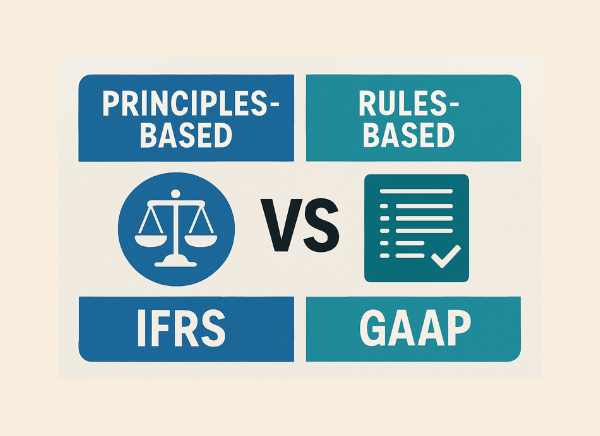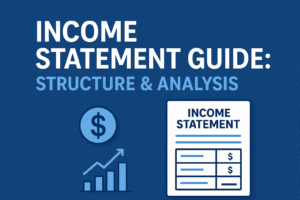Accounting systems serve as the foundation for financial transparency, investor trust, and regulatory compliance. Among the most debated topics in global accounting is the distinction between principles-based and rules-based accounting. While both methods aim to present a true and fair view of financial statements, their approaches differ fundamentally in flexibility, interpretation, and application.
This article explores the key differences between these two systems, their core philosophies, real-world applications, and implications for international financial reporting.
Principles-Based vs. Rules-Based Accounting: An Overview
At the heart of the debate between these accounting frameworks is how standards are developed and applied.
- Principles-based accounting provides broad guidelines and relies on professional judgment.
- Rules-based accounting is rigid, governed by detailed, prescriptive rules that dictate exactly how transactions must be recorded.
These systems impact not just how financial statements are prepared, but also how auditors review them and how regulators enforce them.
Principles-Based Accounting
Principles-based accounting focuses on overarching concepts and objectives rather than minute technical details. It emphasizes the spirit of the law over the letter of the law.
Key Characteristics:
- Emphasizes substance over form
- Encourages professional judgment
- Promotes flexibility and adaptability to different industries or new transactions
- Allows companies to present a more accurate economic reality
Pros:
- Greater flexibility in financial reporting
- Better adaptation to complex and evolving business models
- Enhances global comparability through interpretation
Cons:
- May lead to inconsistent application
- Leaves more room for subjective judgment and potential abuse
- Can challenge auditors and regulators due to ambiguity
IFRS (International Financial Reporting Standards) is the most notable principles-based system used globally by over 140 countries.
Rules-Based Accounting
Rules-based accounting relies on detailed instructions and frameworks that dictate specific treatments for nearly every scenario. This system prioritizes compliance with standardized criteria.
Key Characteristics:
- Emphasizes form over substance
- Reduces ambiguity through extensive guidance
- Encourages uniform application
Pros:
- Offers clear direction and consistent implementation
- Reduces the reliance on judgment
- Minimizes the potential for lawsuits due to structured guidance
Cons:
- May lead to loophole exploitation
- Can result in complex, lengthy standards
- Encourages “check-the-box” compliance instead of economic accuracy
The U.S. Generally Accepted Accounting Principles (GAAP) is a rules-based accounting system.
The 10 Principles of the Rules-Based GAAP Accounting System
U.S. GAAP is grounded in ten foundational principles that guide financial reporting:
- Principle of Regularity – Adherence to standardized rules.
- Principle of Consistency – Uniform application of accounting methods over time.
- Principle of Sincerity – Accuracy and honesty in financial reporting.
- Principle of Permanence of Methods – Stability in accounting practices.
- Principle of Non-Compensation – Full disclosure of all financial data, without offsetting debts.
- Principle of Prudence – Avoid speculation and recognize revenue only when certain.
- Principle of Continuity – Assumes business operations will continue.
- Principle of Periodicity – Financial reporting is segmented into standard time periods.
- Principle of Full Disclosure – All relevant facts must be presented in reports.
- Principle of Utmost Good Faith – Honest and transparent dealings in all transactions.
These principles create a structure that leaves little room for interpretation, supporting consistency and comparability.
Applications of Both Methods
When to Use Principles-Based Accounting:
- Multinational corporations reporting under IFRS
- Businesses operating in industries with evolving financial instruments
- Countries seeking alignment with global reporting standards
When to Use Rules-Based Accounting:
- U.S. public companies and entities under SEC regulation
- Firms in heavily regulated industries (e.g., banking, healthcare)
- Situations demanding detailed documentation and audit trails
In practice, some companies operate under a hybrid approach, particularly those with dual reporting obligations (IFRS for global, GAAP for U.S. operations).
Problems With Both Systems
Challenges with Principles-Based Accounting:
- Subject to varied interpretations by management and auditors
- Difficult to enforce uniformity
- Greater training required for application and oversight
Challenges with Rules-Based Accounting:
- Can become overly bureaucratic and complex
- Incentivizes firms to exploit technicalities rather than economic intent
- May stifle innovation in financial reporting
Both systems have their vulnerabilities, and neither is immune to accounting manipulation or fraud.
Example of Accounting Manipulation
One of the most infamous examples is the Enron scandal. Enron exploited loopholes within GAAP’s rules-based framework by using Special Purpose Entities (SPEs) to hide debt off its balance sheet. The transactions technically complied with GAAP rules, but they distorted the company’s true financial condition.
This case highlighted how a rigid, rules-based system can still be manipulated if companies prioritize technical compliance over ethical reporting.
What Is the Difference Between IFRS and GAAP?
| Feature | IFRS | GAAP |
| Nature | Principles-Based | Rules-Based |
| Governing Body | IASB (International Accounting Standards Board) | FASB (Financial Accounting Standards Board) |
| Global Use | 140+ countries | Primarily U.S. |
| Flexibility | High – relies on judgment | Low – detailed guidance |
| Structure | Conceptual framework | Codified standards |
| Revenue Recognition | Focuses on control | Focuses on risks and rewards |
Why Does Most of the World Use IFRS?
IFRS has been widely adopted due to its global harmonization, simplicity, and adaptability. It:
- Encourages cross-border investments
- Reduces compliance costs for multinational companies
- Promotes transparency and comparability in international financial statements
As globalization increases, so does the need for a standardized accounting language, making IFRS the preferred system for most countries.
Why Use IFRS Instead of GAAP?
Key Advantages of IFRS Over GAAP:
- Flexibility for industry-specific reporting
- Improved comparability for international stakeholders
- More relevant disclosures focused on the economic substance of transactions
- Reduced duplication for companies listed on multiple exchanges
However, critics argue IFRS’s flexibility may lead to inconsistencies and aggressive earnings management if not monitored properly.
Final Thoughts
Whether a company uses principles-based or rules-based accounting depends largely on jurisdiction, business complexity, and stakeholder expectations. While principles-based systems like IFRS promote judgment and adaptability, rules-based systems like GAAP emphasize uniformity and structure.
Ultimately, the best accounting framework is one that ensures transparency, reliability, and relevance — aligning the reported financials with economic reality while resisting manipulation.







